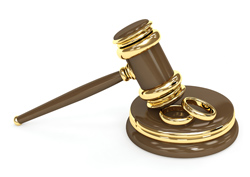Wife's unauthorized access to husband's emails could violate Wiretap Act, 7th Circuit says

Putting an auto-forward on your husband’s email account when you suspect that he’s cheating on you can amount to a violation of the federal Wiretapping and Electronic Surveillance Act, the Chicago-based 7th U.S. Circuit Court of Appeals decided on Dec. 14.
Paula Epstein, the defendant in the case, was sued by her husband, Barry Jay Epstein, the Chicago Daily Law Bulletin reports. The couple are in the process of divorcing, according to the opinion (PDF), and Paula accused Barry of “serial infidelity.” His attorney asked for proof, and her attorney produced email correspondence between Barry and several other women. According to the opinion, Barry did not know that Paula had access to his emails until they showed up in discovery. He alleges that she must have arranged for his emails to be automatically forwarded to her.
The couple married in 1970, and Paula Epstein filed for divorce in 2011 in Cook County. Barry Epstein filed the federal case in 2014. He also named Jay Frank, Paula’s lawyer, as a defendant. U.S. District Court Judge Thomas J. Durkin granted a summary judgment to dismiss the action in 2015.
The 7th Circuit upheld dismissing the case against Frank, but reversed in regards to Paula Epstein, deciding that the claim against her could go forward.
“The complaint doesn’t state a Wiretap Act claim against Paula’s lawyer. The lawyer can’t be liable for disclosing Barry’s own emails to him in response to his own discovery request,” Judge Diane S. Sykes wrote for the 7th Circuit. “The allegations against Paula, on the other hand, technically fall within the language of the act, though Congress probably didn’t anticipate its use as a tactical weapon in a divorce proceeding.”
Judge Richard Posner wrote a concurrence. He agreed that Paula Epstein’s alleged conduct violated the Wiretap Act, but wasn’t sure that the federal law, which authorizes civil actions against people who violate it, was meant to address that sort of behavior. He notes that adultery remains a crime in Illinois, although rarely prosecuted.
“Her husband’s suit under the Federal Wiretap Act is more than a pure waste of judicial resources: It is a suit seeking a reward for concealing criminal activity,” Posner wrote. “Had the issue been raised in the litigation, I would vote to interpret the Act as being inapplicable to—and therefore failing to create a remedy for—wiretaps intended, and reasonably likely, to obtain evidence of crime, as in this case, in which the plaintiff invoked the Act in an effort to hide evidence of his adultery from his wife.”
Other federal courts have held that that the Wiretap Act only applies to emails that are in transit, the majority opinion notes. Based on the email time stamps in the appeal, it could be possible that some of Barry Epstein’s emails were intercepted at the time of transmission, the court wrote, though the defendants maintain they were forwarded later.



